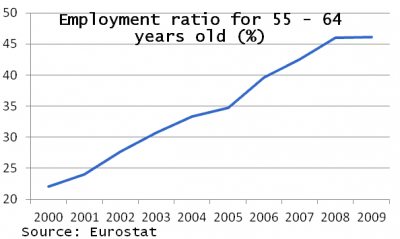Abstract
- In Bulgaria, during the years 2000-2009, there has been an increase from 21% to 46% in the employment rate of people aged 55-64 years old. This means that this country has managed to catch up with the mean value for all the members of EU (in 2000, Bulgaria’s value was the lowest one).
- The major factors that caused such a significant surge were i) increase in the retirement age from 55 to 60 years and from 60 to 63, for women and men respectively and ii) restriction of the privilege to go on the so called early retirement from 20% to 6% of the insured
- Strong economic growth in the last decade supported the increase in employment of the elder people. In the years 2000-09 GDP growth reached 4,6% on average.
- People aged 55-64 years old were not the targeted group in the labour market policy for the reasons of its strong heterogeneity. Instead priority was rather given to: i) the chronically unemployed, ii) ethnic minorities, iii) people with elementary education and iv) the youths (in the age of 15-24 years old)
- Despite the lack of significant interest in the analysed age group in the light of labour market policy, dynamics of the employment rate growth of age group 55-64 years old has been higher when compared to the whole society or the youths.
- Surge in the level of employment of people reaching retirement age was not followed by the further divergence in the level of employment among men and women. In contrast, the gap in the employment has narrowed by 1/5.
Whole analysis (in Polish) available here.




